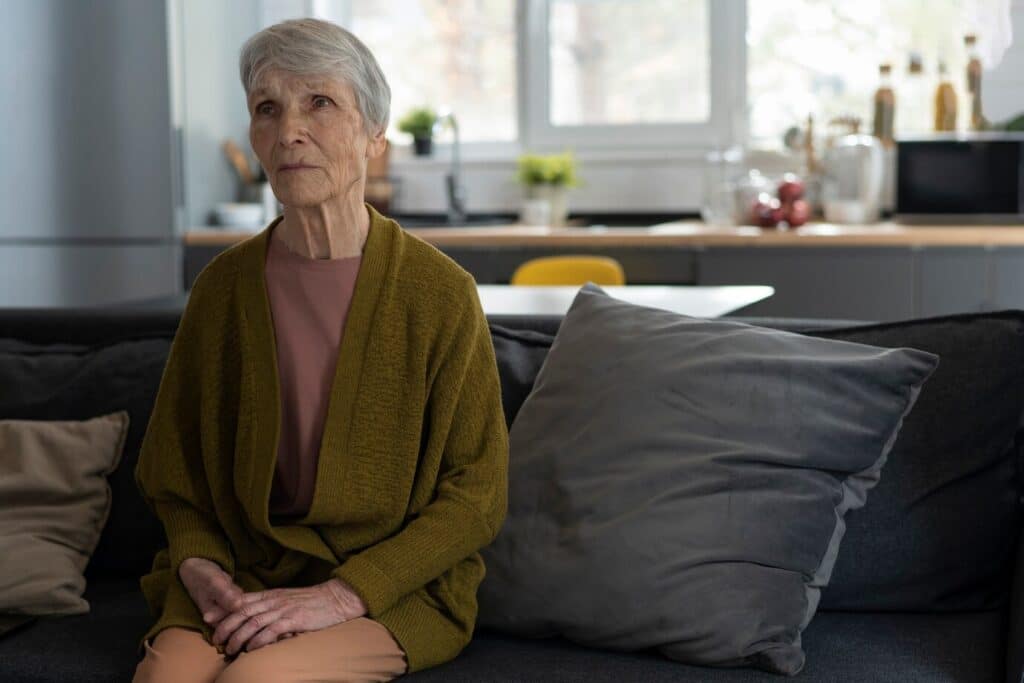Understanding Anxiety in Older People and How to Treat It
Anxiety in older people is a growing concern that often goes unnoticed. As individuals age, they face emotional, physical, and social changes that can intensify anxiety. These factors, from health-related fears to isolation, may seem subtle but significantly impact mental well-being. Fortunately, it’s possible to manage this condition effectively with the proper awareness and approach. At Westmont of Cypress, we support older adults by creating spaces where emotional health is just as valued as physical care.
What Causes Anxiety in Older Adults
When exploring the causes of anxiety in older adults, it’s essential to look beyond the surface. Retirement, bereavement, declining health, and changes in living environments often disrupt a person’s sense of routine and security. These life transitions create uncertainty that fuels anxious thoughts. Furthermore, older adults may experience reduced mobility or independence, which can feel disorienting and frightening. Understanding these root causes can shift how we care for and support aging individuals.
In many cases, unresolved trauma, untreated medical conditions, or even certain medications may intensify symptoms. It’s essential for caregivers and loved ones to be mindful of how these physical and emotional triggers interact over time. Creating a safe, consistent environment and promoting open communication can significantly reduce stress and foster a sense of stability.
Recognizing Symptoms of Anxiety in the Elderly
Identifying the symptoms of anxiety in the elderly is the first step toward compassionate care. Unlike younger individuals who may openly express their emotions, older adults often internalize them. You might notice subtle shifts like irritability, restlessness, or difficulty concentrating. They may also complain about frequent headaches, nausea, or insomnia—physical symptoms that are closely tied to emotional distress.
Another standard indicator is avoidance behavior. Older individuals may withdraw from social situations or activities they previously enjoyed. This retreat from engagement can deepen feelings of isolation and, in turn, worsen anxiety. Being observant and gently encouraging conversation can help uncover underlying issues before they escalate.
Managing Anxiety in the Elderly at Night
Nighttime can be incredibly challenging for individuals dealing with anxiety in the elderly at night. As external stimulation decreases and the environment quietens, anxious thoughts can grow louder. Fear of falling, nightmares, or confusion due to cognitive decline often surface during these hours. Many older adults also experience disrupted sleep cycles, which contributes to a loop of fatigue and heightened anxiety the next day.
Consider creating a calming bedtime routine with dim lighting, soft music, or relaxing reading to ease this. Avoiding caffeine or heavy meals in the evening can also reduce sleep disturbances. Gentle reassurance from caregivers and the presence of a nightlight or familiar object can make a big difference. If the anxiety persists, consulting a healthcare provider is essential.
How Do You Treat Severe Anxiety in the Elderly
One of the most pressing questions families ask is: How do you treat severe anxiety in the elderly? The approach should be personalized and holistic. For many older adults, therapy—particularly Cognitive Behavioral Therapy (CBT)—is highly effective. CBT helps individuals recognize and reframe anxious thoughts, offering practical tools to manage stress.
In more severe cases, medication may be considered. However, this must be handled cautiously, as older adults are more sensitive to side effects and interactions. Non-pharmacological approaches such as mindfulness, gentle exercise, and structured daily routines offer tremendous relief without added risks. Encouraging activities that bring joy and purpose, such as gardening, volunteering, or joining community events at Westmont Living, can also help reduce symptoms naturally.
Supporting Older Adult Anxiety Through Social Connection
One of the most potent antidotes to older adult anxiety is consistent social support. A sense of belonging and purpose can work wonders for emotional health. Whether it’s regular visits from family, phone calls with grandchildren, or participation in group classes, these interactions foster connection and reduce feelings of loneliness.
At Westmont of Santa Barbara, social events are designed to help residents feel engaged and included. From art workshops to music therapy, these gatherings offer opportunities to build friendships, share experiences, and find comfort in routine.
Introducing structured activities in small, manageable steps can encourage participation for those who struggle to initiate social interactions. Even simple daily interactions—such as greeting neighbors or helping with communal tasks—build confidence over time.

Coping Skills for Older Adults With Anxiety
Developing coping skills for older adults is key to long-term emotional health. Deep breathing exercises, progressive muscle relaxation, and guided imagery can help manage symptoms as they arise. These techniques empower individuals by giving them control during anxious moments.
Encouraging older adults to practice gratitude journaling or engage in creative outlets such as painting or storytelling can also provide therapeutic benefits. These activities distract from negative thoughts and reinforce positive thinking patterns. Introducing coping strategies early and consistently can improve resilience and prevent the escalation of anxiety.
You can explore additional relaxation techniques in our post on relaxing activities that help with anxiety, which are easy to integrate into daily routines.
When Anxiety Demands Immediate Attention
Sometimes, despite best efforts, anxiety becomes unmanageable. When typical coping strategies fall short, and the condition interferes with daily living, it’s time to seek professional intervention. Prolonged distress, panic attacks, or changes in behavior such as aggression or withdrawal are severe signs.
Understanding how do you treat severe anxiety in the elderly in these cases means working collaboratively with healthcare providers. A combined plan involving therapy, community support, and sometimes medication can dramatically improve quality of life. Remember, anxiety is not an inevitable part of aging—it’s treatable with the right approach and care.
At Westmont of Cypress, we are committed to providing resources and compassionate care that supports residents and their loved ones on this journey.
For more information or to speak with our team, call us today at 714-252-7144.
Discover the level of care you or your family member requires. What Level of Care Do You Need?
Frequently Asked Questions
How does anxiety present in older adults?
Anxiety in older adults may manifest as excessive worry, restlessness, irritability, or trouble sleeping. It can also manifest as physical symptoms like fatigue, muscle tension, or increased heart rate. Sometimes, anxiety may be mistaken for other health issues, so it’s important to monitor emotional and physical changes. Older adults may also avoid social activities or fear health, finances, or the future.
How to manage anxiety in the elderly?
Managing anxiety in the elderly often involves a combination of approaches, including therapy, medication, and lifestyle changes. Cognitive-behavioral therapy (CBT) is incredibly effective, as is regular physical activity, social engagement, and relaxation techniques like deep breathing or meditation. For some, medication may be prescribed, but it should be carefully monitored due to potential side effects. Support from loved ones and healthcare providers also plays a key role.
Why do people get more anxious as they age?
People may become more anxious with age due to increased health concerns, loss of independence, or changes in social support. Life transitions such as retirement, bereavement, or chronic illness can trigger or worsen anxiety. Additionally, older adults may be more prone to worry about the future or safety. Age-related brain changes and medication side effects can also contribute to heightened anxiety.
Can anxiety start at any age?
Yes, anxiety can begin at any age, including during childhood, adulthood, or later in life. While many people experience anxiety earlier in life, it can also emerge for the first time in older adulthood due to life changes or health issues. No matter when it starts, anxiety is treatable with the right support and care. Early recognition and intervention can significantly improve quality of life.








